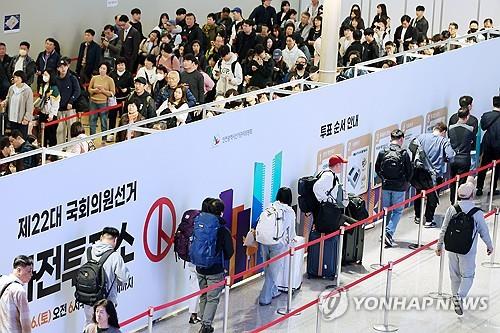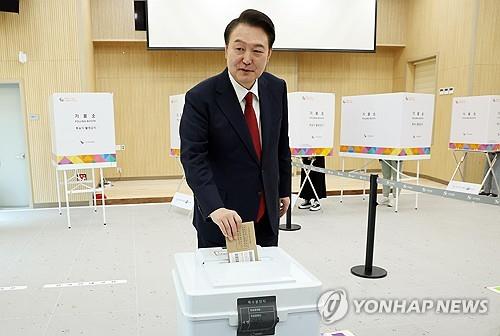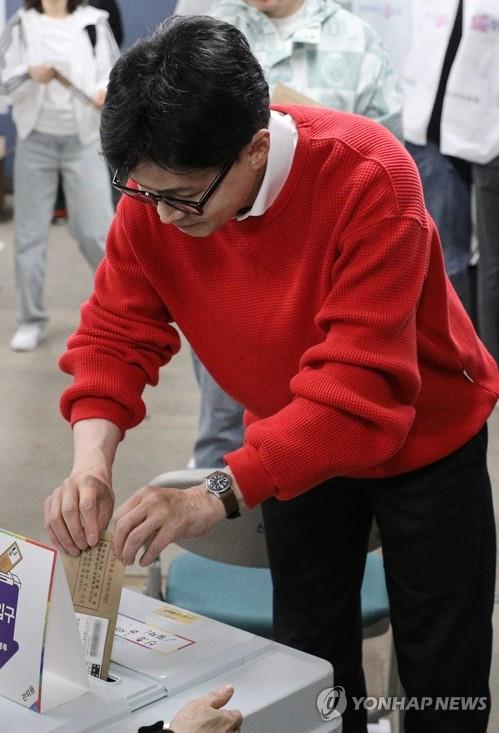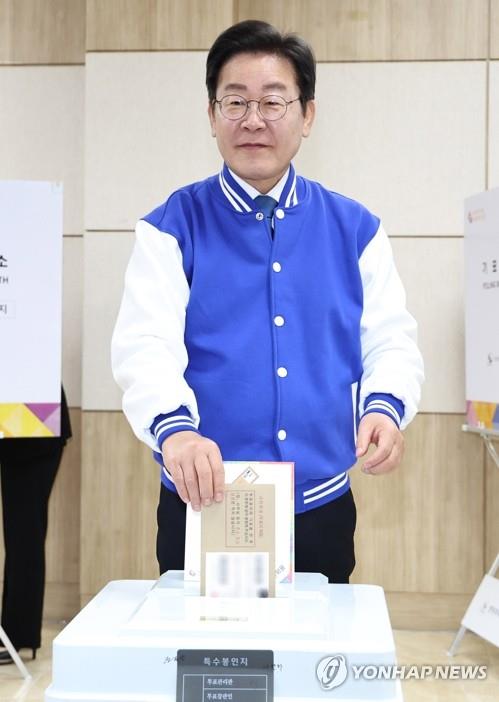- California Assembly OKs highest minimum wage in nation
- S. Korea unveils first graphic cigarette warnings
- US joins with South Korea, Japan in bid to deter North Korea
- LPGA golfer Chun In-gee finally back in action
- S. Korea won’t be top seed in final World Cup qualification round
- US men’s soccer misses 2nd straight Olympics
- US back on track in qualifying with 4-0 win over Guatemala
- High-intensity workout injuries spawn cottage industry
- CDC expands range of Zika mosquitoes into parts of Northeast
- Who knew? ‘The Walking Dead’ is helping families connect
Early voting kicks off amid record high turnout
Early voting began Friday ahead of next week’s parliamentary elections, with turnout reaching a record high amid high interest in the vote seen as a midterm referendum on the administration of President Yoon Suk Yeol.
Voters began casting ballots at 3,565 polling stations nationwide at 6 a.m. in the two-day early voting taking place ahead of Wednesday’s main vote to elect a new 300-member National Assembly. Voting hours are from 6 a.m. to 6 p.m.
As of 1 p.m., more than 3.54 million people out of some 44.28 million eligible voters had cast their votes, recording a turnout of 8 percent, compared with 5.98 percent in the 2020 general elections. It marks the highest turnout for parliamentary elections since the early voting system was adopted in 2012.
The turnout, however, is slightly lower than 8.75 percent in the 2022 presidential election.

The quadrennial race holds significant importance for the ruling People Power Party (PPP) as failure to regain a majority could potentially render President Yoon a lame duck for the remaining three years of his single five-year term.
The main opposition Democratic Party (DP), which had secured a landslide victory in the previous elections, aims to retain its parliamentary majority.
After calling on the nation to exercise their voting rights, Yoon cast an early vote in the southeastern port city of Busan.

Rival parties have also stepped up calls for voters to cast their ballots in the early voting, recognizing the potential impact of the advance voting turnout on determining the final election outcome.
Leaders of both parties visited polling stations, urging voters to exercise their rights.
“If you go to the polling station, (we) win, and if you don’t go to the polling station, the Republic of Korea will fail,” PPP leader Han Dong-hoon told reporters after casting a ballot at a polling station in Seoul.
Citing the high turnout rate, DP Chairman Lee Jae-myung said it shows the public’s interest in politics.
“I ask that people actively participate in the voting today and tomorrow,” Lee said after voting in the central city of Daejeon while on the campaign trail.
The early voting turnout was 26.7 percent and 36.8 percent in the previous elections in 2020 and 2016, respectively.
The DP has said it aims to achieve an early voting turnout of 31.3 percent and a total turnout of 71.3 percent for this year, assuming that a high turnout will lead to victory for the party.

In the previous election, the total turnout reached 66.2 percent, and the DP won 180 out of 300 seats.
The PPP, however, has refuted the assumption, arguing that high turnout does not necessarily favor the DP.
According to a survey conducted jointly by Yonhap News Agency and Yonhap News TV earlier this week, 80 percent of respondents expressed a definite intention to cast their votes.
Among those intending to vote, 39 percent plan to visit polling stations during the early voting period, while 58 percent intend to vote on Election Day next Wednesday.













